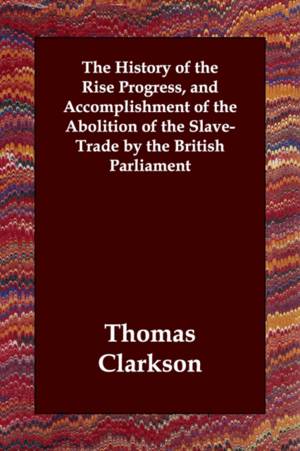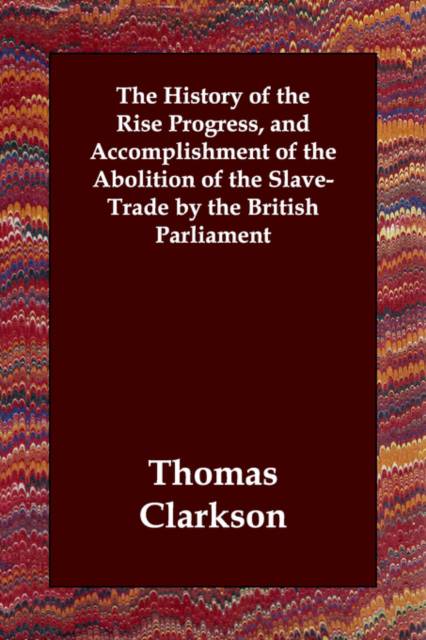
Bedankt voor het vertrouwen het afgelopen jaar! Om jou te bedanken bieden we GRATIS verzending (in België) aan op alles gedurende de hele maand januari.
- Afhalen na 1 uur in een winkel met voorraad
- In januari gratis thuislevering in België
- Ruim aanbod met 7 miljoen producten
Bedankt voor het vertrouwen het afgelopen jaar! Om jou te bedanken bieden we GRATIS verzending (in België) aan op alles gedurende de hele maand januari.
- Afhalen na 1 uur in een winkel met voorraad
- In januari gratis thuislevering in België
- Ruim aanbod met 7 miljoen producten
Zoeken
The History of the Rise Progress, and Accomplishment of the Abolition of the Slave-Trade by the British Parliament
Thomas Clarkson
Paperback | Engels
€ 20,95
+ 41 punten
Omschrijving
Thomas Clarkson (1760-1846) was an English abolitionist, and a leading campaigner against the slave trade in the British Empire. He helped found The Society for Effecting the Abolition of the Slave Trade and helped achieve passage of the Slave Trade Act of 1807 which ended British trade in slaves. In his later years Clarkson campaigned for the abolition of slavery worldwide - then concentrated in the Americas. In 1840 he was the key speaker at the Anti-Slavery Society's first conference in London whose aim was to end slavery in other countries. It was at Cambridge in 1785 that Clarkson entered a Latin essay competition that was to set him on the course he was to follow for the rest of his life. The topic of the essay was 'Is it lawful to enslave the unconsenting?' and it led him to consider the question of the slave trade, reading everything he could on the subject, including the works of Anthony Benezet, a Quaker abolitionist, as well as first-hand accounts of the African slave trade. After winning the prize Clarkson had what he termed a spiritual revelation from God and this experience, and sense of calling, led him to devote his life to abolishing the slave trade. He published his Latin essay in English translation as a pamphlet in 1786 and as a result was introduced to others sympathetic to abolition, including James Ramsay and Granville Sharp, many Quakers, and other nonconformists. The abolitionist movement had been gathering strength for some years having been formed by Quakers both in Britain and the US, and in 1783 300 Quakers had presented Parliament with the first petition against the slave trade. Clarkson's involvement gained momentum and he continued to publish essays which provided a grounding for William Wilberforce's first abolitonist speech in the House of Commons in 1789, and his 12 propositions. The war with France delayed any progress on the abolitonist cause but in 1804 Clarkson revived his efforts and was particularly active in persuading MPs to back the parliamentary campaign. In 1808, now celebrated as a national figure and model of philanthropy, he published his book History of the Rise, Progess and Accomplishment of the Aboliton of the Slave Trade. The book provides historians with much of the detail of the abolition campaign and is an important record of the movement.
Specificaties
Betrokkenen
- Auteur(s):
- Uitgeverij:
Inhoud
- Aantal bladzijden:
- 424
- Taal:
- Engels
Eigenschappen
- Productcode (EAN):
- 9781406803273
- Verschijningsdatum:
- 22/08/2006
- Uitvoering:
- Paperback
- Formaat:
- Trade paperback (VS)
- Afmetingen:
- 152 mm x 229 mm
- Gewicht:
- 616 g

Alleen bij Standaard Boekhandel
+ 41 punten op je klantenkaart van Standaard Boekhandel
Beoordelingen
We publiceren alleen reviews die voldoen aan de voorwaarden voor reviews. Bekijk onze voorwaarden voor reviews.









